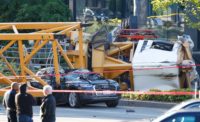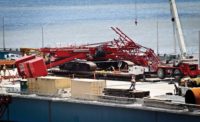The investigation into a September crane collapse in Mecca, Saudi Arabia, has reportedly resulted in five indictments, including officials at lead contractor Saudi Binladen Group. According to reports in the Saudi Gazette and other local media, the government of Saudi Arabia has charged five engineers with negligence in connection with the Sept. 11 collapse of a crawler crane onto Mecca’s Grand Mosque. The collapse killed 111 and injured 394, making it the deadliest crane collapse in decades.
According to local media reports, the five accused are engineers and project managers, and include employees of Saudi Binladen Group as well government officials in charge of overseeing the ongoing construction surrounding the Grand Mosque. The Saudi Bureau of Investigation and Public Prosecution has not made an official announcement of the indictments yet, and the names of the accused have not been released.
Following the September collapse, the Saudi government officially sanctioned Saudi Binladen Group, preventing its senior officials from leaving the country and banning the firm from working on public projects.
The investigation has focused on the way the crane was stowed in preparation for an oncoming rainstorm with high winds. In a statement released in September, officials for Liebherr, the manufacturer of the toppled crane, had said that the 1,350-tonne Liebherr LR 11350 crawler crane was “technically faultless” and that the tip-over was caused by improper stowage of the boom and luffing jib prior to the storm. Saudi investigators appear to have followed a similar line of reasoning, charging the engineers with loss of life, negligence and noncompliance with established safety measures.
The crane was working on a multibillion-dollar, 400,000-sq-meter expansion of the Grand Mosque site. The project is intended to increase the capacity of the religious site to accommodate the larger crowds for the annual hajj pilgrimage. The 2015 hajj saw over two million attendees, and Saudi Arabia is in the middle of a construction boom to expand the infrastructure of the holy sites. September's fatal crane collapse was partially overshadowed by a stampede a few weeks later. The Associated Press has estimated that over 2,400 people were killed in that incident, more than three times the initial estimate.






Post a comment to this article
Report Abusive Comment